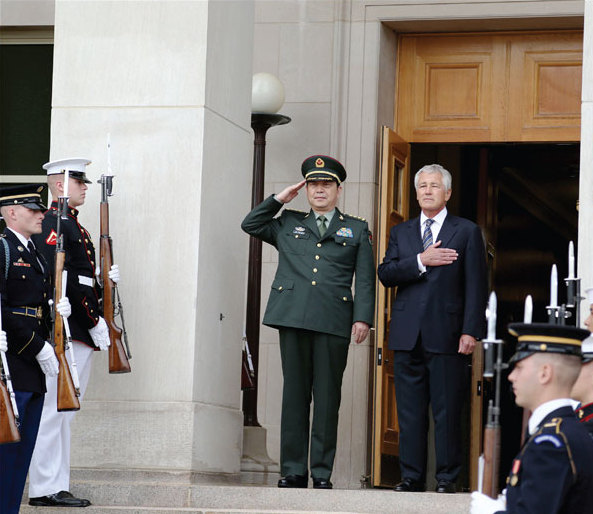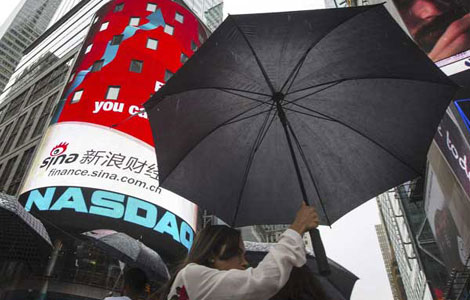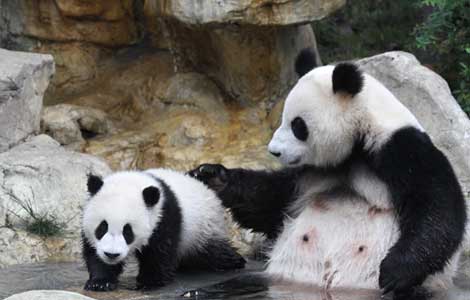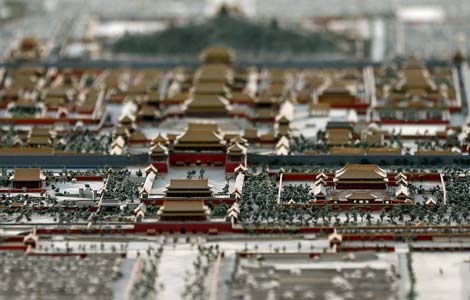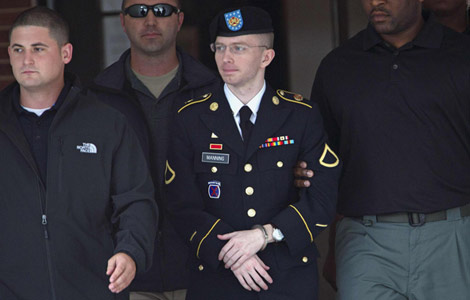The hidden reefs in China-US relations
Updated: 2013-08-23 11:35
By Chen Weihua (China Daily)
|
||||||||
|
US Defense Secretary Chuck Hagel and an honor guard welcome China's Minister of National Defense Chang Wanquan at the Pentagon in Washington. Chenbei Sun / China Daily |
While China and the US seek to elevate their military ties, some old stumbling blocks still stand in the way and new issues keep rising, Chen Weihua reports from Washington.
When Chinese Defense Minister Chang Wanquan was greeted with a smile and a warm handshake from his US counterpart, Chuck Hagel, along with an honor guard and marching band outside the Pentagon entrance facing the Washington Monument across the Potomac River, the mood did not mirror the rivalry between the two militaries that has often appeared in the press. Rather, it felt more like a welcome of a friendly ally.
Their talk on Monday, which was originally scheduled for 90 minutes, was extended by another one and one-half hours because, as one aide later said, the two new defense chiefs felt they had so much to talk about.
At a news press conference after the meeting, the two both expressed a strong willingness to increase military exchanges and cooperation to reflect the spirit of the Sunnylands summit, referring to the meeting in early June between President Xi Jinping and President Barack Obama in California when they vowed to defy the historical precedents of clashes between an existing super power and a rising power.
Chang summarized the talks by referring to a "five-point consensus" agreed to by the two sides at the meeting: that a bilateral military tie is an important part of relations between the two nations; a boosting of high-level visits by both countries; that both sides shoulder a heavy responsibility in ensuring peace and stability in the Asia-Pacific region; cooperation in non-traditional areas such as humanitarian assistance and cooperation in military archives.
Hagel said he "enthusiastically accepted" Chang's invitation to visit China next year. In addition, other senior military leaders from both sides will also exchange visits.
The Chinese People's Liberation Army (PLA) will for the first time participate in the 2014 Rim of the Pacific Exercise, the world's largest naval exercise, in Hawaii.
However, for the Chinese, the warming-up of a bilateral military relationship may not sail smoothly if some hidden rocks are not removed.
Taiwan sales
Guan Youfei, director of the foreign affairs office of the Ministry of Defense, said the Chinese have expressed deep concern over three major stumbling blocks: US arms sales to Taiwan, air and naval surveillance off the Chinese coast and a host of US laws that bar military cooperation and exchange with China.
To Chinese on the mainland, the continuous and expanding US arms sales to Taiwan is simply unacceptable, especially as the relationship across the straits has turned better than ever since 2008 when Ma Ying-jeou became the leader in Taiwan.
While the US sold arms amounting to only a few billion dollars in the first of the past three decades, the last two decades saw sales balloon to $27 billion from $19 billion, according to Guan.
China announced it was suspending military contacts with in the wake of the US arms sales to Taiwan in 2010 and 2011.
Most Viewed
Editor's Picks

|

|

|

|

|

|
Today's Top News
The hidden reefs in China-US relations
School work: Chinese want less, US more
McCain comments about Diaoyu draw fire
Chinese scientists asked to improve toilet
Bo Xilai denies bribery charges
Experts say police need guns on patrol
Nasdaq resumes stock trading
German mitten crabs not 'qualified for import'
US Weekly

|

|
